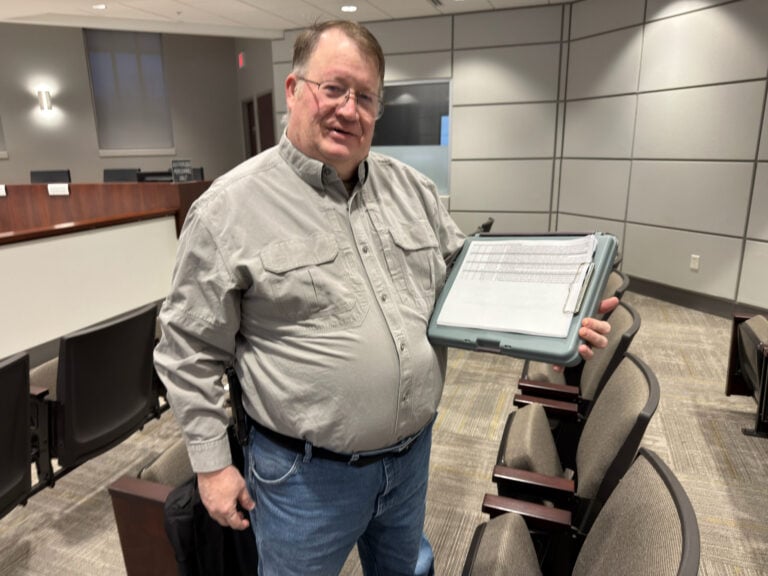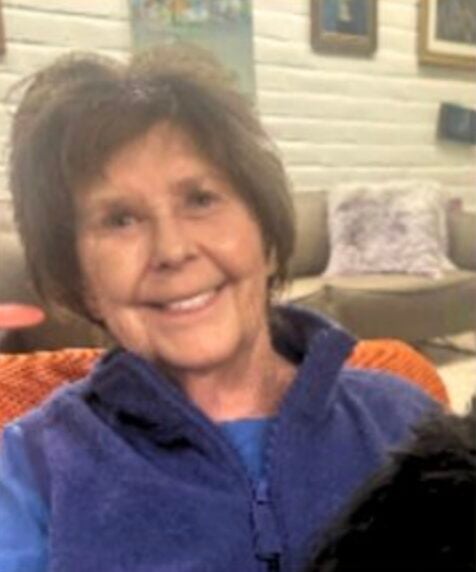
By Kristy Robinson Horine
NKyTribune contributor
The door swings open and he steps out into the sunshine. It has been eight years since he has felt this free.
It has also been eight years since he has felt intimidated by freedom.
He still has a sentence to serve, but this time he will be behind invisible bars, out there in his community. He will answer to a probation officer instead of a warden. He will wear an electronic monitoring device that tracks his every move.
He knows that if he really wants a chance at a new life, he can’t get near the old one.
Despite the uncertainty of this new path, he is not alone. From her desk miles away in Lexington, Melissa Johnson will walk this road with him.
Melissa has been a mental health specialist since 1993. A native of Letcher County, she works with upwards of 30 people a week as an Integration Specialist at Lexington’s Corrisoft, a technology firm that offers a holistic, hopeful approach to alternatives for incarceration.
“Everyone needs an opportunity to move forward in their lives, regardless of their circumstances. Every story is different and everybody has one,” she says. “But (people) have the opportunity to change that, so. . . I’m here to help offer the skills they maybe have not had in their lives.”
At Corrisoft, giving offenders an opportunity to move forward, was at least seven years in the making.
Clearing the record
A few years ago Bill Johnson had reached the pinnacle of success in his career. He had been in Kentucky for 22 years, had climbed the corporate ladder as an executive with an international company that employed 60,000 people worldwide and had reached $15 billion in revenue. Yet, there was something missing.

“I was blessed with a lot of opportunities, but I got to a point where I wasn’t doing anything for anybody,” Johnson says. “Everybody hits that point where they just feel the need to give back and I was at that point.”
A serendipitous contact changed Johnson’s life. An investor from Louisville asked him to look into a Lexington-based company that had started with four software developers trying out a web-based application they could make money on. They had begun with expungement services. Under Johnson’s leadership, the company morphed into felon-friendly employment services.
“We found we didn’t have the means to communicate with people we were trying to help, so we went into mobile application. Through the mobile app, we could communicate, we could send them job applications and job opportunities,” Johnson says. “Then we started getting asked to bring that model to other cities and states. But we found out we had to subcontract ankle bracelets.”
The older models of ankle bracelets are heavy and bulky. They are equipped with a GPS tracker system and a battery that must be charged for two hours a day. In addition, the software used in the old ankle bracelets had a 2g capacity.
“I thought, this is the corrections industry, how can we not have the technology?” Johnson says, then he picks up an ankle bracelet with one hand and points to an iPhone on the table with the other. “That 4s phone has better technology than this ankle bracelet, yet we trust them. I didn’t believe there was (such) a gap in technology.”
While Corrisoft is mainly a technology firm, it goes beyond offender monitoring into life-sculpting. This is where the AIR -Alternative to Incarceration via Rehabilitation — comes into play. It is based on three components: accountability, rehabilitation and reintegration that work in tandem to reduce recidivism rates while increasing public safety, saving taxpayer money, and making a difference in the lives of offenders.
Making it work
More than one in four offenders becomes a repeat offender. There are multiple reasons for this — history and environment, lack of resources, being ostracized after release, no life skill training, and an overworked parole and probation system. On average, parole and probation officers are responsible for upwards of 150 offenders at one time. Corrisoft’s aim is to provide essential wraparound services in a holistic manner to combat these problems.

A judge can include the AIR program into the sentencing phase. When an offender is released from prison, or put on probation in lieu of incarceration, the offender is fitted with a lightweight ankle tether. This tether is programmed to work with a Corrisoft-owned and operated smartphone. The smartphone is customized with a Corrisoft mobile application. The app features a calendar reminder, secure AIR-mail, and a contact button for 24/7 communication.
The parole or probation officer is supplied with an AIR dashboard, which allows the agency a chance to have a bird’s eye view of all offenders. Agencies decide on which services they need and Corrisoft fills the gaps.
Aside from the basic technology, there are two tiers of call center specialists. The first tier is a 24/7 monitoring system. The specialists act as liaisons between the offender and the parole or probation officers. They also troubleshoot any issues with the Corrisoft-owned soft- or hardware.
The second tier is Integration Specialists, like Melissa, who offer real-life help, such as making sure an applicant is groomed appropriately for a job interview or celebrating a period of sobriety or talking an offender through a stressful or tempting situation.

“Most offenders come out with no driver’s license, further behind on their child support or homeless. With all those additional pressures, there are going to be problems,” Melissa says. “We try to help them deal with the day to day and the minute to minute. They’ve got to learn that if they can cope with that, then the bigger stuff they can get through.”
There are safeguards with the technology. The phone cannot be turned off. It has to be carried close enough to the tether to be able to communicate with the tether. It is specially designed to be remotely controlled. If, based on real-time GPS tracking, an offender is in an unauthorized area, Corrisoft can remotely access the smartphone cameras to take a look around and see the area and the condition of the offender. Specialists can then alert agency officials.
While the Corrisoft technology is not being used directly in Kentucky, it is finding success. It is monitoring and reintegrating offenders out of the Southeast Regional Community Corrections Agency in Indiana. The agency serves Dearborn, Ohio and Switzerland counties.
In a pilot program, Corrisoft is helping young offenders with monitoring and accountability on a pre-trial basis in New York. The biggest hope there, Johnson says, is to keep the young offenders out of Rikers Island and in a place where they can be monitored and given real life skills through the Corrisoft specialists.

The bottom line, Johnson says, is that his company’s method is paying off in two ways.
“The average incarceration cost is $80 a day. Juveniles can cost up to $200 a day,” he says and explains that Corrisoft can ‘stack’ services, from basic monitoring to fully integrated services with an average of three contacts per day per offender from his specialist team, all of which run near $20 a day.
The second pay-off is that offenders have a chance to become productive members of society and of their families.
For Johnson and the rest of the Corrisoft team, success is a chance to help 4.8 million people on parole or probation in the United States.
“They walk you to the front of the jail and they say, okay, now go play nice with society. Quit being bad. This person spends five, ten, 15 years in incarceration, how are you supposed to do that? If you want to release them and expect them to be good in society, why don’t you treat them like that? If you treat them like this,” Johnson picks up the heavy ankle bracelet, “they will act like this. We have to give them the tools to change their behavior.”
While the definition of success is mostly dependent on the offender, Melissa Johnson, who has direct frontline contact, says that success comes in different packaging than what most people believe.
“Success is being able to go to a child’s parent-teacher meeting, understand what is being said, and then be able to go home and work with a child on that topic. The rest of us may look at that and blow it off, but for them, that’s a success,” Melissa explains.
“If you’ve been in prison for seven years and have had no contact with your child and you are suddenly in this position and you accomplish [a meeting], that is success. You made it to work on time. You have been employed for three months. See? Successes.”

















